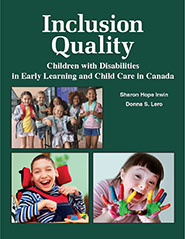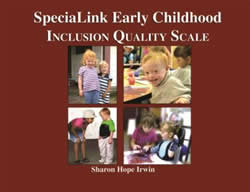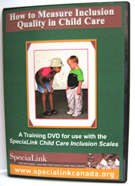SPECIALINK NEWS
|
|
|
Dr. Sharon Hope Irwin speaks at the
Child Care Assembly in Ottawa, November 19, 2023 |
Good morning.
I’m Sharon Irwin, director of SpeciaLink: The National Centre for Child Care Inclusion. I am currently working on a federal project gathering essential information regarding the impact of the Covid pandemic on the inclusion of children with disabilities in Child Care and Early Learning. The project continues our primary commitment to the universal inclusion of children with disabilities in Canada.
And the most important word in all of that is “disabilities.” While terms such as “vulnerable children” and the “children of immigrants” and so forth are certainly important parts of the general definition of inclusion, people tend to use definitions of inclusion that leave out “children with disabilities” or, at best, put children with disabilities at the bottom of the list, almost as an afterthought. And I am here today to urge all of us to recognize that if we don’t put “children with disabilities” at the top of our definition of inclusion, these are the children most likely to be left out, refused admission to child care, considered too expensive or too demanding to be included.
We all understand that inclusion of children with disabilities—children with autism, cerebral palsy, the blind—children who require special medical intervention during the day such as children with diabetes or severe allergies—these are the children who will need extra assistance and will be the most costly to include.
So while we are grateful that the federal government has agreed to fund more spaces and provide better wages in childcare, we must recognize that this new initiative does not do anything to require the inclusion of children with disabilities.
Will the new spaces—renovated or newly constructed—be mandated to include wide doorways for wheelchairs and other adaptations required to include children with disabilities? Will the new wage formula provide one-to-one assistance that some children need? Will the required Early Childhood training include skills for working with children with extra needs? Or are we missing this opportunity to fully include children with disabilities?
In 1975, I started working as director of Town Daycare in Glace Bay, Nova Scotia. Early on, we commited our program to including children with disabilities. We soon found ourselves providing tube-feeding, Braille and one-to-one special exercises. We learned that successful inclusion of children with disabilities means that the child with disabilities is in the same room with her typical peers, and that those peers are learning tools of empathy and support while they play with children with disabilities.
Town Day Care became a model for the inclusion of children with disabilities across Canada. And nearly 50 years later, Town Day Care continues to provide child care based on its principles of inclusion. If you went there today, you would see children with disabilities at play with their typical peers, and in some cases you would have a hard time picking out the child with disabilities.
And here I stand, 50 years later, in a hotel that does not provide a handicapped room, does not have a walk-in shower, in a country that talks about inclusion but does not have the essential regulations needed to make inclusion of people with disabilities universal.
This is an important gathering. We are fortunate the Minister of Families, Children and Social Development, the Honorable Jenna Sudds, is with us. This gathering is an opportunity for us to praise what we and government have accomplished in terms of new child care spaces and higher wages for child care workers. And it is also an opportunity to send a message to government and to our colleagues that the definition of the word “inclusion” must firmly and foremost begin with “inclusion of children with disabilities” rather than as an afterthought.
I urge us all to adopt a definition of inclusion that truly supports the needs of children that we too often leave out—children with disabilities.
I want to invite everyone to enjoy a video visit to Town Day Care to see some of its inclusion successes with children with disabilities. Please go to the link to those videos below.
Thank you for this opportunity.
Sharon Hope Irwin
Director, SpeciaLink:
The National Centre for Child Care Inclusion |
| |
Celebrating 50 Years of Inclusion
of Children with Disabilities |
|
|
For 50 years, Town Day Care has continued its commitment to including children with disabilities in its regular child care program, including those child alongside their typical peers.
You can enjoy free video visits to Town Day Care by clicking on Shawn and his Mainstream Parents and on Casey: Fragile and in the Mainstream—two of the five stories in the DVD called The Mainstream is the Right Stream.
Shawn and his Mainstream Parents
Casey: Fragile and in the Mainstream |
|
|
New Book From SpeciaLink |
|
|
Inclusion Quality:
Children with Disabilities
in Early Learning
and Child Care in Canada |
|
|

This book, Inclusion Quality, is an urgent report
about where Canada is today with respect to the inclusion
of children with disabilities in early learning and child
care. While the federal government’s current Multilateral
Framework on Early Learning and Child Care addresses
many factors essential to the development of a strong national
system of early learning and child care in Canada, it does
not focus sufficiently on inclusion quality for children
with disabilities. Without this focus, these children, and
their families, will get left behind.
Inclusion Quality presents a thoughtful analysis of the recent work of SpeciaLink—the results of observations using the SpeciaLink Early Childhood Inclusion Quality Scale, in over 65 early learning and child care centres across Canada, and provides essential recommendations toward improving the quality of care for children with disabilities.
Free PDF: Inclusion Quality is available right now in this website as a PDF, at no cost. Click here: resources/index.html
The Executive Summary and Recommendations from Inclusion Quality are available in French and in English, here: resources/index.html
Inclusion Quality is also available in paperback for $40.00. Order it at https://capebretonbooks.com/t/specialink
SpeciaLink Early Childhood Inclusion Quality
Scale

At the heart of the SpeciaLink Inclusion Quality project is the SpeciaLink Early Childhood Inclusion Quality Scale—the tool we used for the observations in the book above, Inclusion Quality.
The SpeciaLink Inclusion Scale is the tool for assessing inclusion quality in early childhood centres and for helping centres move toward higher quality inclusion of children with disabilities. Using the SpeciaLink Inclusion Scale workbook, you can produce a picture of sustainable and evolving inclusion quality in your classrooms and centres. This information is essential as more and more children with disabilities attend early learning and child care centres.
The SpeciaLink Early Childhood Inclusion Quality
Scale is available at https://capebretonbooks.com/t/specialink.
The price is $18.95.
The SpeciaLink training DVD
is also available:
It is called “How to Measure
Inclusion Quality
in Child Care.” You can order
it at
https://capebretonbooks.com/t/specialink.
Price $40.00, includes shipping.
"How to Measure Inclusion Quality in Child Care" is a SpeciaLink Training DVD for the SpeciaLink Inclusion Scale.
This DVD trains in the use of The SpeciaLink Early Childhood Inclusion Quality Scale. The Scale is the critical tool for assessing inclusion quality in early learning and child care centres—a major issue as more and more centres commit to including more children with disabilities.
|
 |
© 2004-2021 SpeciaLink. All rights
reserved.
Site maintenance by [design
by FADER Communications]
|
|

Dr. Sharon Hope Irwin,
Executive Director
and Senior Researcher
SpeciaLink:
The National Centre
for Early Childhood Inclusion
specialink@ns.sympatico.ca
SpeciaLink is The National Centre for Early Childhood Inclusion, a non-profit organization dedicated to the equitable inclusion of children with disabilities in child care and other community programs. Responding in the late 1970s to parents of children with disabilities and to local advocates and professionals, SpeciaLink has become the national force for inclusion of young children with disabilities. Since 1990, with support from the Government of Canada, SpeciaLink provides research and resources to assist parents, ELCC programs, training institutions, advocates, consultants and researchers to improve the quality and quantity of inclusive child care across Canada.
|





